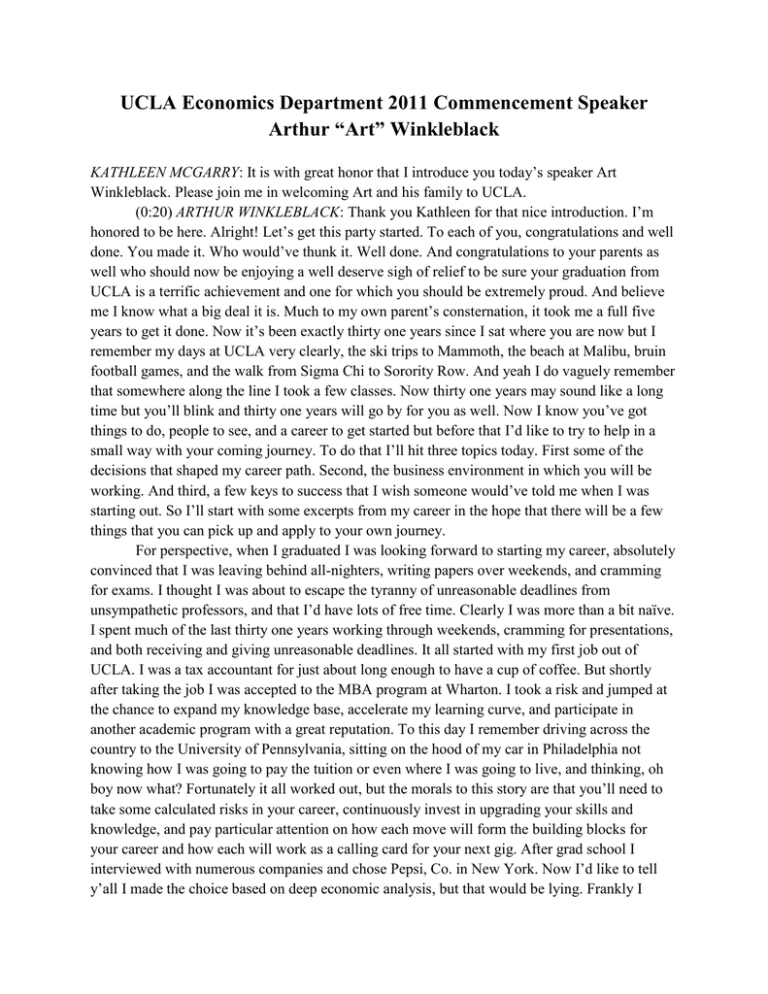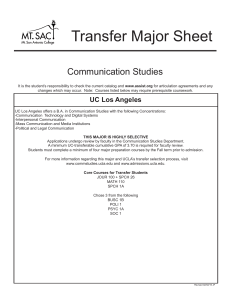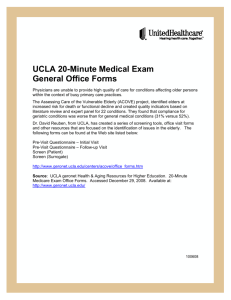UCLA Economics Department 2011 Commencement Speaker Arthur “Art” Winkleblack
advertisement

UCLA Economics Department 2011 Commencement Speaker Arthur “Art” Winkleblack KATHLEEN MCGARRY: It is with great honor that I introduce you today’s speaker Art Winkleblack. Please join me in welcoming Art and his family to UCLA. (0:20) ARTHUR WINKLEBLACK: Thank you Kathleen for that nice introduction. I’m honored to be here. Alright! Let’s get this party started. To each of you, congratulations and well done. You made it. Who would’ve thunk it. Well done. And congratulations to your parents as well who should now be enjoying a well deserve sigh of relief to be sure your graduation from UCLA is a terrific achievement and one for which you should be extremely proud. And believe me I know what a big deal it is. Much to my own parent’s consternation, it took me a full five years to get it done. Now it’s been exactly thirty one years since I sat where you are now but I remember my days at UCLA very clearly, the ski trips to Mammoth, the beach at Malibu, bruin football games, and the walk from Sigma Chi to Sorority Row. And yeah I do vaguely remember that somewhere along the line I took a few classes. Now thirty one years may sound like a long time but you’ll blink and thirty one years will go by for you as well. Now I know you’ve got things to do, people to see, and a career to get started but before that I’d like to try to help in a small way with your coming journey. To do that I’ll hit three topics today. First some of the decisions that shaped my career path. Second, the business environment in which you will be working. And third, a few keys to success that I wish someone would’ve told me when I was starting out. So I’ll start with some excerpts from my career in the hope that there will be a few things that you can pick up and apply to your own journey. For perspective, when I graduated I was looking forward to starting my career, absolutely convinced that I was leaving behind all-nighters, writing papers over weekends, and cramming for exams. I thought I was about to escape the tyranny of unreasonable deadlines from unsympathetic professors, and that I’d have lots of free time. Clearly I was more than a bit naïve. I spent much of the last thirty one years working through weekends, cramming for presentations, and both receiving and giving unreasonable deadlines. It all started with my first job out of UCLA. I was a tax accountant for just about long enough to have a cup of coffee. But shortly after taking the job I was accepted to the MBA program at Wharton. I took a risk and jumped at the chance to expand my knowledge base, accelerate my learning curve, and participate in another academic program with a great reputation. To this day I remember driving across the country to the University of Pennsylvania, sitting on the hood of my car in Philadelphia not knowing how I was going to pay the tuition or even where I was going to live, and thinking, oh boy now what? Fortunately it all worked out, but the morals to this story are that you’ll need to take some calculated risks in your career, continuously invest in upgrading your skills and knowledge, and pay particular attention on how each move will form the building blocks for your career and how each will work as a calling card for your next gig. After grad school I interviewed with numerous companies and chose Pepsi, Co. in New York. Now I’d like to tell y’all I made the choice based on deep economic analysis, but that would be lying. Frankly I made the choice on a simple observation. During the interview process the leaders I met with in the corner offices of their headquarters were generally young, vibrant, and had little grey hair. From that observation I figured the company was fast paced and willing to take risk on young leaders. That hypothesis proved to be correct and I spent twelve years there doing seven jobs in five different states. It turns out that Pepsi, Co. at that time was a very tough environment and one of the best training grounds in industry. Look for those kinds of training grounds. So, after the first twelve years of my career I had UCLA, Wharton, and Pepsi, Co. on my resume. That combination of great training, early responsibility, and brand recognition has since taken me anywhere I’ve wanted to go in my career. The “so what here” is that as you look forward, establish a strong career foundation from the start and carefully shape what your calling cards will be. After years of big company experience I took another calculated risk and followed a mentor of mine into the world of private equity and internet startups. That was a chance to leverage my hard-earned experience and as they say, grab for the brass ring. Over a six year period I must admit it was a bit of a Star Wars bars scene, where I helped lead and sold a theme park company, expanded a package food company, built and then shrunk an internet portal, and then tried to save another internet firm. Now to make a long story short I didn’t catch the brass ring but all were great learning experiences. You learn a lot about the fundamentals of business when you’re worried about where the cash will come from for next week’s payroll. But when the internet bubble burst in 2001, it was time to get back to a stable industry because when you put a good management team against a bad business or industry, all too often the bad business wins. In other words do your homework and be sure to recognize which ways the economic winds are blowing. Riding a tailwind is a whole lot easier then facing a persistent head wind. Now because of the strong foundation I built in my career and the calling cards in my resume, I successfully made it out of the internet industry during a very difficult economy. Many were not that fortunate. But I landed on my feet as EVP and CFO of Heinz, and for close to ten years I’ve been part of a terrific turnaround story. The company is now known to have a tightly focused portfolio, some of the most recognized brands of the world, a global business with almost two-thirds of the revenue coming from outside the U.S., a very strong platform and emerging market, and one of the best track records in the package food industry. But ten years ago the company clearly needed some work. We very aggressively reshaped and simplified the portfolio, dramatically improved the talent, implemented better process discipline, and started upgrading systems around the world. In short, to turn the business around, we worked our tails off, made some tough and often unpopular decisions and would not settle for second best. So, some of the key lessons from my career early on focus on great training, build a strong foundation, and don’t be afraid to work hard and take some risks. But now let’s turn to the business environment. It’s clear that you’ll be competing in a much tougher and more global one than one I started thirty one years ago. Given that, I think it’s important to underscore a few basic facts. 95% of the world’s nearly 7 billion people live outside of the United States. Emerging markets represent about 90% of the world’s population and their economies are growing at an average rate of three times that of the U.S. More than a third of the world’s population lives in just two countries, China and India. By the time you are the one doing this commencement speech, China is like to have replaced the U.S. as world’s largest economy. The exploding demanding for food and basic materials will put a strain on the world’s resources. And in the United States we now have the highest corporate tax rate on earth making it more difficult for businesses based here to compete. Which is compounded by the high debt level carried by our nation that crowds out investment and value in our infrastructure. So what does all this mean? Well first of all, it means you are all very smart to become economics major so well done. Your generation will have to be very sophisticated in understanding how the world works. It also means that you should develop strong communication skills in more than one language, that is, if you haven’t already. Be aware the cultural differences and biases across borders. And finally be highly mobile and willing to move around internationally. It is very likely that the future business leaders at Heinz and at other multinationals will have lived or worked in one or more emerging markets, thus I would strongly encourage you to be open to the big adventure that is out there beyond our borders where huge growth can create tremendous career opportunities for those that are up for the challenge. So on this big day when you have so much to be proud of… what thoughts would I suggest you take forward. Over the years I’ve collected a number of philosophies from my own experiences and I’ll give you my top ten. Number one, what got you here won’t get you there. Now that’s the title of an excellent book by Marshall Goldsmith and I love the phrase. As you progress through your career, the skills and attributes that got you to your current level will not be sufficient to get you to your next level. You’ll need to evolve from being an individual contributor to managing a group to galvanizing an entire organization around a common and compelling vision all the while not forgetting how to do real work. So don’t try to take shortcuts, never get too comfortable, you’re always entering a new game with a new set of rules. Number two, intellect and a relentless drive to win will carry you a long way. Many organizations have achieved great success by following a simple approach, hire very smart people who will not accept defeat. Sometimes that will to win is driven by the inverses emotion, the fear of failure. Either way put in the hard work and sweat needed to ensure your success. Number three, consistently confront reality and be an agent of change. It’s not enough to do the current job well, you got to take your task, your group, or organization to the next level. To be an effective agent of change you will need to create a burning platform. Being trained in economics you will be in a powerful position to do this with facts and analysis. Number four, leaders with great integrity energize everyone around them. Integrity needs to be your foundation. People respect it and spark to it. Integrity will emerge or not during defining moments. Be sure to recognize your own defining moments and always have the courage to do the right thing. Number five, when you pick the best players, you win. Just like elementary school kickball, college soccer or fantasy football, you feel…the best players and most of the time you win. I might add that this applies to your personal life as well. I’ve been blessed to be married to the same woman for thirty years who is, by the way, also a UCLA Economics Grad as Kathleen said. She’s been a tremendous part of my career’s success and personal happiness. So in all aspects of your life, pick the best player. Number six, effective listening is one of the most underrated skills in life. In the book Head, Heart and Guts the authors point out that good listeners listen with respect, think before they speak and carefully gage the response they get. Remember, that listening with respect shows how important they are not how important you are. Great ideas come from all kinds of different places and from people at all different levels. Never lose your humility or think you have all the right answers. No matter how smart you are you can’t know everything. Number seven, the correct response to feedback is always a simple thank you. Remember, that perception is reality. Those who respond defensively or rationalize a way, feedback offered by a boss, a co-worker, spouse or friend are doomed to repeat mistakes and ultimately derail. When you make a mistake or are off-track, openly recognize it, fix it and advertise the fix. Look at feedback as a gift; it takes courage to give it and grace to receive it. Number eight, understand whether you are the scarecrow, the tin man or the cowardly lion. Now, hang in there with me on this. I’m getting some puzzled looks. For those of you who’ve seen the classic old move The Wizard of OZ, the three characters: one is searching for intelligence, one for compassion and one for courage. To make a long story short, each of us approaches problems and opportunities differently: some analytically with our head, some emotionally with our heart and some with pure guts. It’s important to know which type of person you are, which type your audience is and the strengths and shortcomings associated with each natural approach. Number nine, gratitude is not a limited resource; we breathe it in but often forget to exhale. Always show appreciation to those who help you. Remember that the world is really a very small place. By saying thank you and acknowledging someone’s contribution, you’ll be doing the right thing and you never know when that appreciation might be paid for, maybe even decades later. And finally, number ten, in your career be prepared to partner, lead and serve. At different points you will have the most value by being a good partner to your coworkers, providing insights to help shape their thinking. At other times you will need to lead, clearly setting the direction and taking full responsibility for the outcome. And on different occasions your role will be to serve; simply helping others achieve something for the good of the organization. It will be incumbent upon you to have the wisdom, confidence and humility to know which approach is required at each moment along the way. And just like products have brands that evoke a particular image, you will develop a brand over time. Be sure you know what that brand stands for and that you nurture it, shape it and protect it well. So those are a few comments on the journey ahead, if you keep them in mind I suspect they may help. Now finally, I want to close with a question when the Clayton Christensen, a professor at Harvard, asked his students before they graduate. That simple question is: How will you measure success in your life? I’m going to say that again, how will you measure success in your life? It’s a simple question but a tough one to answer. Clearly, some degree of career success is part of your consideration you wouldn’t be sitting here today. But there’s a whole lot more to it. Everyone is motivated by something different: power, achievement, fame, fortune or a whole host of other things. Here’s the point: know yourself, and identify what will make you personally happy over the long term. Understand that everything you do comes with tradeoffs, but with some planning and thoughtful allocation of your time, energy and talent you’ll get what you need to be successful, whatever that might mean to you. And while you shouldn’t over-plan your life’s journey, you may not just want to jump in the career river and see where it takes you. Have at least a general idea of where you want to end up before you begin. So to conclude, thank you for allowing me to join your celebration today. I wish you the best of luck as your career begins. Make the world a better place and enjoy every part of your journey ahead. Thanks.


